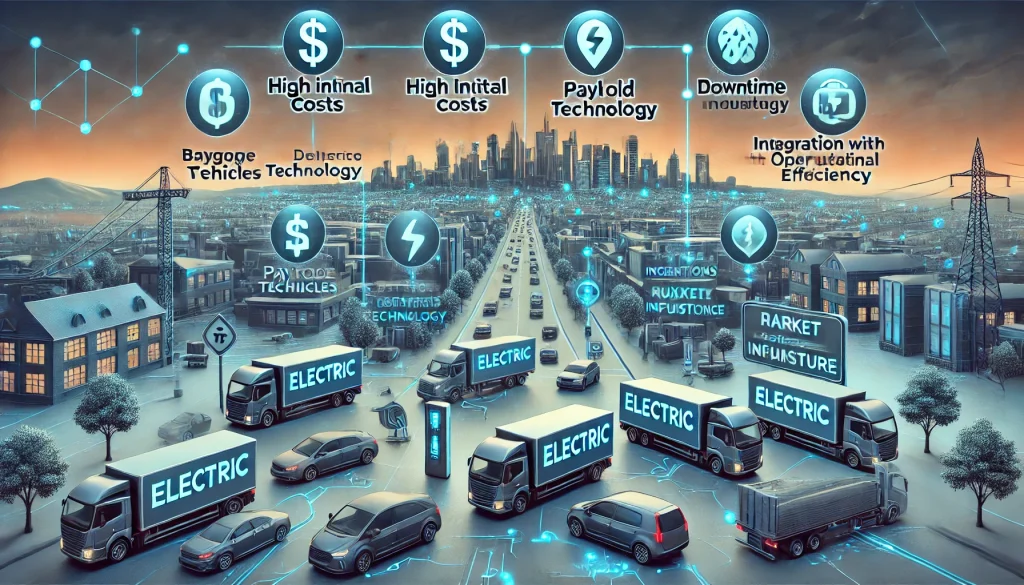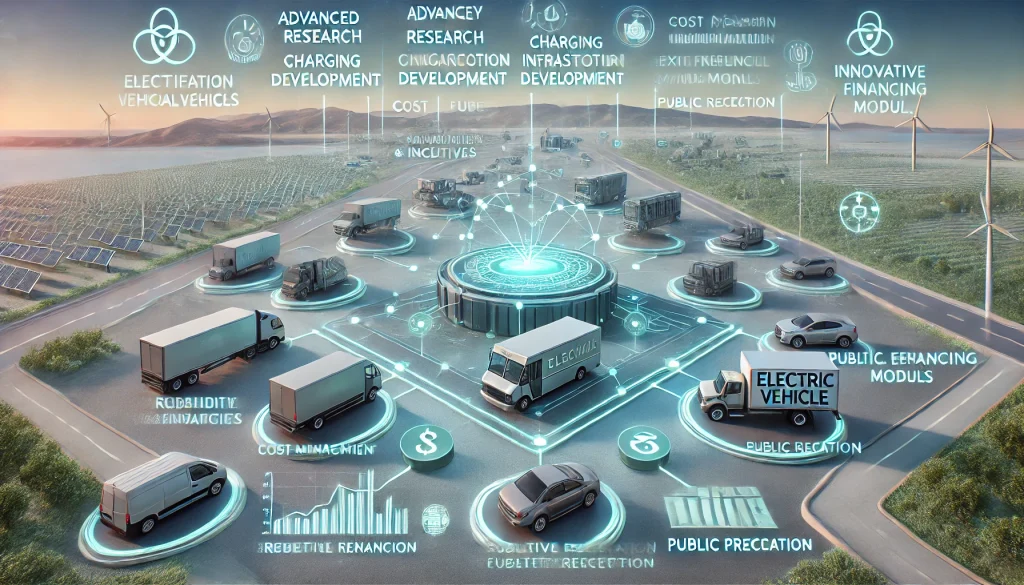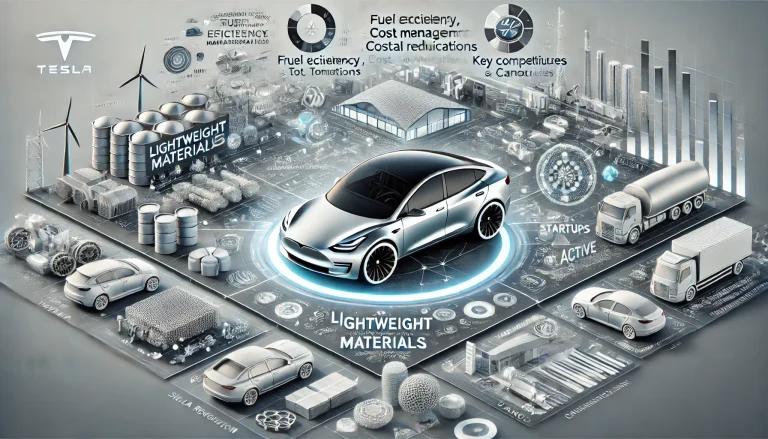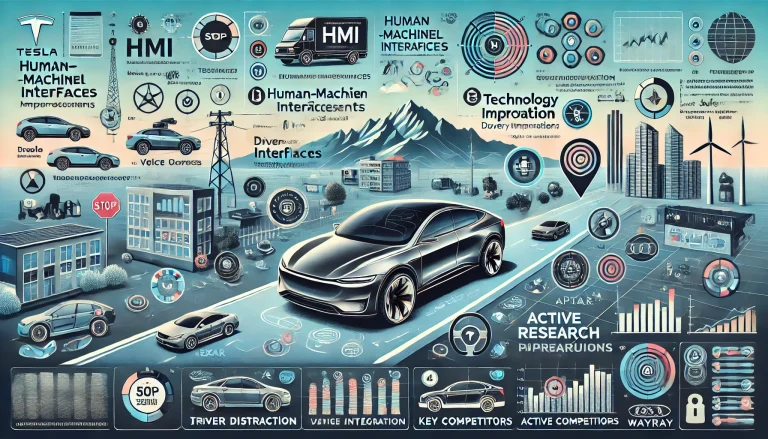Problem Statement
The global shift towards electrification is rapidly expanding beyond passenger vehicles, reaching into the realm of commercial transportation, including delivery vans, trucks, and buses. This electrification trend is driven by the urgent need to reduce greenhouse gas emissions, combat air pollution, and achieve sustainability goals in urban and long-haul transportation. Governments and regulatory bodies worldwide are implementing stricter emissions standards and offering incentives to accelerate the adoption of electric commercial vehicles (ECVs). At the same time, businesses and municipalities are increasingly seeking cleaner, more efficient transport solutions to meet the demands of modern logistics and public transit systems.
The electrification of commercial vehicles presents unique challenges compared to passenger vehicles. The primary concerns include the high initial costs of electric vehicles (EVs), the need for significant advancements in battery technology, and the development of a widespread charging infrastructure capable of supporting large fleets. Additionally, the commercial vehicle sector requires vehicles with longer ranges, greater payload capacities, and the ability to operate in a variety of demanding environments, from urban centers to rural areas.
Battery technology is a critical area of focus for the electrification of commercial vehicles. Current batteries must be improved to deliver the range, durability, and fast charging capabilities necessary for heavy-duty applications. The weight of batteries also affects payload capacity, making it crucial to balance energy density with overall vehicle efficiency. Moreover, the high cost of batteries contributes to the elevated price of ECVs, posing a barrier to widespread adoption, especially for small and medium-sized enterprises (SMEs).
The development of a robust charging infrastructure is another significant challenge. Commercial vehicles, particularly those used for delivery and long-haul transport, require fast and reliable charging options to minimize downtime and ensure operational efficiency. Establishing a network of charging stations that can accommodate large vehicles and high-power demands is essential for the successful transition to electric fleets. This infrastructure must be strategically located, with considerations for urban planning, logistics hubs, and long-haul routes.
In addition to technological and infrastructure challenges, the electrification of commercial vehicles is influenced by regulatory policies and market incentives. Governments are increasingly implementing emissions regulations, zero-emission zones, and financial incentives to encourage the adoption of ECVs. However, these policies vary widely across regions, creating a complex landscape for businesses operating in multiple markets. Navigating this regulatory environment requires careful planning and adaptation to ensure compliance and maximize the benefits of available incentives.
Despite these challenges, the electrification of commercial vehicles offers significant benefits, including reduced operating costs, lower emissions, and improved public health outcomes in urban areas. As businesses and municipalities increasingly prioritize sustainability, the demand for electric commercial vehicles is expected to grow, driving innovation and investment in this sector.
To fully realize the potential of electrification in commercial transportation, industry stakeholders must address the challenges of battery technology, charging infrastructure, cost management, and regulatory compliance. By doing so, they can accelerate the transition to zero-emission transportation, contributing to a cleaner, more sustainable future.
Pain Points
- High Initial Costs: The elevated price of electric commercial vehicles, driven by the high cost of batteries and new technology.
- Battery Technology: The need for advancements in battery range, durability, energy density, and fast charging capabilities for heavy-duty applications.
- Payload Capacity: Balancing battery weight with payload capacity to ensure the efficiency and effectiveness of commercial vehicles.
- Charging Infrastructure: Developing a widespread, reliable charging network that can support large commercial fleets and high-power demands.
- Downtime and Operational Efficiency: Minimizing downtime due to charging and ensuring that electric commercial vehicles meet the demanding operational schedules of businesses.
- Regulatory Compliance: Navigating varying emissions standards, zero-emission zones, and regulatory policies across different regions.
- Market Incentives: Leveraging financial incentives and subsidies to offset the high initial costs of electric commercial vehicles.
- Range Limitations: Addressing the range limitations of electric vehicles, particularly for long-haul and rural applications.
- Integration with Existing Fleets: Seamlessly integrating electric commercial vehicles with existing fleets, including managing mixed-fuel operations.
- Public and Business Perception: Overcoming skepticism and building confidence in the reliability and benefits of electric commercial vehicles.

Future Vision
Our platform envisions a future where the electrification of commercial vehicles becomes the norm, contributing significantly to the reduction of greenhouse gas emissions and the advancement of sustainable urban and rural transportation. By focusing on key areas such as battery technology, charging infrastructure, cost management, and regulatory compliance, we aim to accelerate the adoption of electric commercial vehicles and support the global transition to zero-emission transportation.
Battery technology will be a cornerstone of this transition. The platform will support research and development efforts to create batteries with greater energy density, longer range, faster charging times, and improved durability. By investing in advanced battery materials and manufacturing processes, the industry can produce more efficient and cost-effective batteries that meet the specific needs of commercial vehicles.
The development of a robust and accessible charging infrastructure will be another critical focus. The platform will facilitate the planning and deployment of strategically located charging stations that cater to the needs of commercial fleets. This includes high-power charging solutions for urban centers, logistics hubs, and long-haul routes, ensuring that electric commercial vehicles can operate with minimal downtime and maximum efficiency.
Cost management and financial incentives will be addressed through targeted strategies to reduce the overall cost of ownership for electric commercial vehicles. The platform will help businesses and municipalities navigate the available subsidies, tax credits, and other financial incentives, making the transition to electric fleets more financially viable. Additionally, the platform will explore innovative financing and leasing models that lower the initial costs and spread the investment over time.
Regulatory compliance will be streamlined through the platform’s tools and resources, helping businesses stay up-to-date with emissions standards, zero-emission zones, and other regulations across different regions. By providing real-time information and compliance management solutions, the platform will enable businesses to operate confidently and efficiently in a complex regulatory environment.
The platform will also promote the integration of electric commercial vehicles into existing fleets, offering guidance on managing mixed-fuel operations and optimizing fleet performance. This includes training programs for fleet managers and drivers, as well as data analytics tools to monitor and improve the efficiency of electric vehicles within the fleet.
Public and business perception will be enhanced through the platform’s efforts to showcase the benefits of electric commercial vehicles, including lower operating costs, reduced emissions, and improved air quality. By building trust and confidence in these vehicles, the platform will help drive broader acceptance and adoption across the industry.
Through these initiatives, the platform will play a vital role in advancing the electrification of commercial vehicles, driving innovation, and supporting the global transition to a sustainable, zero-emission transportation future.
Use Cases
- Advanced Battery Research: Supporting R&D efforts to create batteries with greater energy density, longer range, and faster charging capabilities for commercial vehicles.
- Charging Infrastructure Development: Facilitating the planning and deployment of high-power charging stations for commercial fleets in urban centers, logistics hubs, and long-haul routes.
- Cost Management and Incentives: Helping businesses leverage financial incentives and subsidies to reduce the overall cost of ownership for electric commercial vehicles.
- Regulatory Compliance Tools: Providing real-time information and compliance management solutions to navigate emissions standards and zero-emission zones.
- Fleet Integration Strategies: Offering guidance on integrating electric commercial vehicles into existing fleets, including managing mixed-fuel operations.
- Public and Business Perception: Promoting the benefits of electric commercial vehicles to build confidence and drive broader adoption across the industry.
- Innovative Financing Models: Exploring financing and leasing models that lower the initial costs and make electric commercial vehicles more accessible to businesses.
- Operational Efficiency Monitoring: Providing data analytics tools to monitor and optimize the performance and efficiency of electric commercial vehicles within fleets.
- Training Programs: Offering training for fleet managers and drivers on the operation and management of electric commercial vehicles.
- Sustainability Reporting: Helping businesses track and report on the environmental impact and sustainability benefits of their electric vehicle fleets.
Target Users and Stakeholders
- User: Fleet Managers, Automotive Manufacturers, Municipalities, Logistics Companies, and Regulatory Compliance Officers
- Age Group: 30-60 years
- Gender: M/F
- Usage Pattern: Regular usage for transitioning to and managing electric commercial vehicle fleets, ensuring compliance, and optimizing performance
- Benefit: Enhanced ability to adopt and integrate electric commercial vehicles, reduce emissions, improve operational efficiency, and achieve regulatory compliance
- Stakeholders:
- Automotive Manufacturers: Companies developing and producing electric commercial vehicles, seeking to advance battery technology and infrastructure.
- Fleet Operators: Businesses and municipalities managing commercial vehicle fleets, transitioning to electric vehicles for sustainability and cost savings.
- Regulatory Bodies: Agencies responsible for setting and enforcing emissions standards and providing financial incentives for electric vehicles.
- Technology Providers: Companies offering battery solutions, charging infrastructure, and data analytics tools for electric commercial vehicles.
- Customers: Businesses and organizations seeking reliable, efficient, and sustainable transportation solutions for commercial operations.
Key Competition
- Tesla: Leading the development of electric trucks and commercial vehicles with advanced battery technology and a focus on long-range capabilities.
- Rivian: Specializing in electric delivery vans and trucks, with a focus on sustainability and fleet integration for commercial operations.
- BYD: A major player in electric buses and trucks, offering a range of electric commercial vehicles supported by robust battery technology and infrastructure.
- Volvo Trucks: Developing electric trucks for urban and long-haul applications, with an emphasis on reliability, safety, and sustainability.
- Mercedes-Benz eSprinter: Offering electric vans designed for urban delivery and logistics, with a focus on efficiency, range, and fast charging capabilities.
Products/Services
- Tesla Electric Trucks: Leading in the development of electric trucks with long-range capabilities, advanced battery technology, and integrated charging solutions.
- Rivian Electric Delivery Vans: Specializing in electric vans and trucks for commercial operations, with a focus on sustainability and fleet integration.
- BYD Electric Buses and Trucks: Offering a range of electric commercial vehicles, supported by robust battery technology and a comprehensive charging infrastructure.
- Volvo Electric Trucks: Developing reliable and safe electric trucks for both urban and long-haul applications, emphasizing sustainability.
- Mercedes-Benz eSprinter Vans: Providing electric vans designed for urban delivery, with a focus on range, efficiency, and fast charging capabilities.
Active Startups
- ChargeFleet: Specializes in developing high-power charging solutions tailored to the needs of electric commercial vehicle fleets.
- BatteryInnovators: Focuses on advanced battery technology for electric commercial vehicles, improving range, energy density, and charging speed.
- GreenFleet: Offers consulting services to help businesses transition to electric commercial vehicles and optimize fleet performance.
- EcoFleetFinance: Provides innovative financing and leasing models to make electric commercial vehicles more accessible to businesses.
- FleetTrack: Develops data analytics tools to monitor and optimize the performance and efficiency of electric commercial vehicles within fleets.
- ElectraFleet: Specializes in the integration of electric vehicles into existing fleets, offering solutions for managing mixed-fuel operations.
- SustainCharge: Focuses on building sustainable charging infrastructure for electric commercial vehicles, including urban and long-haul applications.
- ReguComply: Provides regulatory compliance tools and resources for businesses operating electric commercial vehicle fleets across multiple regions.
- ZeroEmis: Develops software solutions to help businesses track and report on the environmental impact of their electric vehicle fleets.
- EVTrain: Offers training programs for fleet managers and drivers on the operation, management, and maintenance of electric commercial vehicles.
Ongoing Work in Related Areas
- Battery Technology Research: Innovating in battery technology to improve range, durability, and fast charging capabilities for electric commercial vehicles.
- Charging Infrastructure Development: Researching and developing high-power charging solutions that support the needs of large commercial fleets.
- Fleet Integration Strategies: Exploring best practices for integrating electric commercial vehicles into existing fleets and managing mixed-fuel operations.
- Regulatory Compliance Innovations: Developing tools and resources to help businesses navigate emissions standards and zero-emission zones.
- Cost-Effective Financing Models: Researching innovative financing and leasing models to make electric commercial vehicles more accessible to businesses.
- Sustainability Impact Tracking: Developing software solutions for tracking and reporting on the environmental impact and sustainability benefits of electric vehicle fleets.
- Public Perception and Awareness: Exploring strategies to enhance public and business perception of electric commercial vehicles and drive broader adoption.
- Operational Efficiency Monitoring: Innovating in data analytics tools that monitor and optimize the performance of electric commercial vehicles within fleets.
- Training and Education Programs: Developing comprehensive training programs for fleet managers and drivers on the operation and management of electric commercial vehicles.
- Supply Chain Adaptation: Researching strategies to adapt supply chains for the production and distribution of electric commercial vehicles and their components.
Recent Investment
- ChargeFleet: $50M in Series B funding led by infrastructure-focused venture capital firms, February 2022.
- BatteryInnovators: $45M in Series A funding from advanced battery technology investors, May 2021.
- GreenFleet: $40M in Seed funding from sustainability-focused investors, July 2022.
- EcoFleetFinance: $35M in Series A funding from automotive and green technology investors, November 2021.
- FleetTrack: $30M in Seed funding from data analytics and fleet management investors, January 2022.
Market Maturity
The market for electric commercial vehicles is rapidly maturing as businesses and municipalities recognize the environmental and operational benefits of electrification. Companies like Tesla, Rivian, and BYD are leading the development of electric trucks, vans, and buses, supported by advancements in battery technology and charging infrastructure. Startups such as ChargeFleet, BatteryInnovators, and GreenFleet are driving innovation in high-power charging solutions, advanced battery technology, and fleet integration strategies. Significant investments in battery research, charging infrastructure, and regulatory compliance tools are transforming the commercial vehicle sector, enabling the widespread adoption of electric vehicles for urban and long-haul transportation. As the market continues to evolve, we expect to see more integrated and advanced solutions that support the global transition to zero-emission transportation.
Summary
The electrification trend is expanding beyond passenger vehicles to include commercial vehicles, such as delivery vans, trucks, and buses. The push towards zero-emission transportation is driving the development of electric commercial vehicles, supported by regulatory incentives and the growing demand for cleaner urban transport solutions. Our proposed platform leverages advanced battery research, charging infrastructure development, cost management and incentives, regulatory compliance tools, fleet integration strategies, public and business perception enhancement, innovative financing models, operational efficiency monitoring, training programs, and sustainability reporting to address the challenges of electrifying commercial transportation. Key pain points include high initial costs, battery technology, payload capacity, charging infrastructure, downtime and operational efficiency, regulatory compliance, market incentives, range limitations, integration with existing fleets, and public and business perception.
Target users include fleet managers, automotive manufacturers, municipalities, logistics companies, and regulatory compliance officers, with stakeholders encompassing automotive manufacturers, fleet operators, regulatory bodies, technology providers, and customers. Key competitors like Tesla, Rivian, BYD, Volvo Trucks, and Mercedes-Benz eSprinter offer various electric commercial vehicle solutions, while startups such as ChargeFleet, BatteryInnovators, and GreenFleet are driving innovation in high-power charging solutions, advanced battery technology, and fleet integration strategies. Recent investments highlight significant interest and growth potential in platforms addressing the challenges of electrifying commercial vehicles.
By addressing these challenges and implementing innovative electrification strategies, the commercial vehicle sector can contribute to a sustainable, zero-emission future, enhancing urban and rural transportation while reducing environmental impact.



